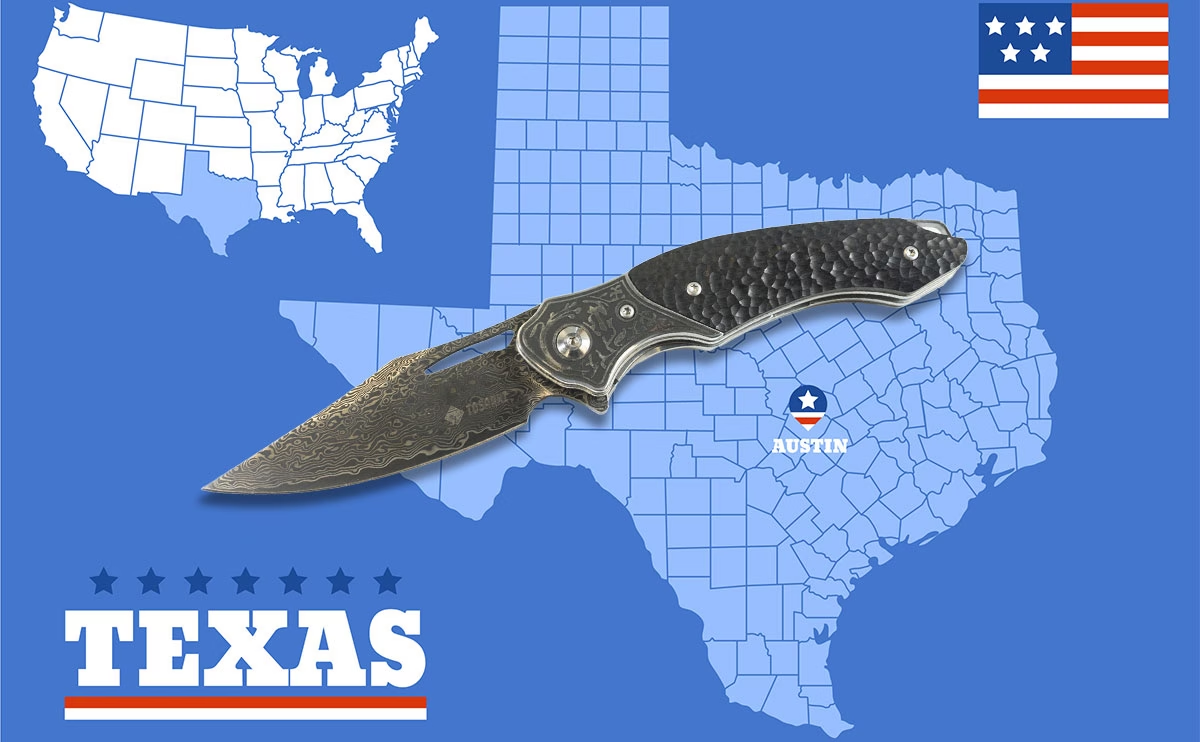2025 Update Texas Knife Laws

Texas has some of the most knife-friendly laws in the United States, making it attractive for knife enthusiasts, collectors, and those who carry blades for self-defense. However, it is crucial to understand Texas knife laws to ensure compliance and avoid legal issues. This guide provides a detailed breakdown of Texas knife laws, including legal definitions, restrictions, and regulations governing knife ownership and carry in the Lone Star State.
Legal Definitions of Knives in Texas
Texas law defines various types of knives, and understanding these definitions is crucial for compliance. The primary legal distinctions include:
- Knife: Any bladed hand instrument capable of inflicting serious bodily injury or death.
- Location-Restricted Knife: A knife with a blade over 5.5 inches in length.
- Dagger: A knife with sharpened edges on both sides, such as a stiletto, dirk, or poniard.
- Bowie Knife: A large fixed-blade knife designed for fighting and outdoor use.
- Machete: A large, heavy blade typically used for agricultural purposes.
- Switchblade Knife: A knife with an automatic blade deployment mechanism.

Are Knives Legal to Own in Texas?
Texas law allows for broad ownership of knives, including most types of blades. Unlike other states with strict restrictions, Texas permits the possession and ownership of all knives, including:
- Switchblades and automatic knives
- Bowie knives and large fixed-blade knives
- Daggers and double-edged knives
- Throwing knives and stars
- Butterfly (Balisong) knives
There are no ownership prohibitions, meaning anyone can legally purchase, own, and store these knives without restriction.
Where You Can Legally Carry Knives in Texas
Texas has liberal knife carry laws, but certain restrictions apply based on the length of the blade. The key legal distinction is whether or not the knife is location-restricted (blade longer than 5.5 inches).
Unrestricted Carry Areas
You can openly or concealed carry a knife with a blade under 5.5 inches in most places, including:
- Public streets and sidewalks
- Vehicles and personal property
- State and local parks
- Private businesses (unless expressly prohibited by the owner)
- Restaurants and bars (as long as alcohol sales do not exceed 51% of revenue)
Restricted Locations for Knives Over 5.5 Inches
If the blade exceeds 5.5 inches, the knife is classified as a location-restricted knife and cannot be carried in the following places:
- Schools and educational institutions (including colleges and universities)
- Polling places during voting periods
- Government buildings and courthouses
- Correctional facilities (jails, prisons, detention centers)
- Amusement parks
- Churches, synagogues, and other places of worship
- Hospitals, nursing homes, and medical facilities
Violating these restrictions may result in a Class C misdemeanor or higher charges, depending on the circumstances.
Who Can Legally Carry a Knife in Texas?
While most adults can legally carry knives in Texas, the law imposes age restrictions for carrying location-restricted knives:
- Individuals under 18 years old cannot carry a location-restricted knife (blade over 5.5 inches) unless supervised by a parent or guardian.
- Adults 18 and older may carry any legally permitted knife in unrestricted locations.
Self-Defense and Texas Knife Laws
Texas recognizes the right to self-defense, and knives are often used for personal protection. The Stand Your Ground and Castle Doctrine laws allow individuals to use reasonable force, including deadly force, to protect themselves, their property, or others from an imminent threat.
However, self-defense claims must meet specific criteria, including:
- The person must have a reasonable belief that deadly force is necessary.
- The knife must be legally carried in the given location.
- The individual must not be engaged in criminal activity.
Texas Knife Laws for Traveling and Transporting Knives
When traveling with knives in Texas, consider the following regulations:
- Within Texas: Knives under 5.5 inches can be carried without restriction. For knives over 5.5 inches, you must comply with location restrictions.
- Airports and TSA Regulations: Carrying knives past airport security checkpoints is strictly prohibited.
- Interstate Travel: Other states may have stricter knife laws, so checking local regulations before crossing state lines is essential.
Penalties for Violating Texas Knife Laws
Violating Texas knife laws can result in legal consequences, including:
- Class C Misdemeanor: A fine of up to $500 for carrying a location-restricted knife in prohibited areas.
- Class A Misdemeanor: Penalties can increase significantly if the violation occurs on school property.
- Felony Charges: If a knife is used in the commission of a crime, it may lead to felony charges with severe consequences, including imprisonment.
Changes to Texas Knife Laws
In recent years, Texas has significantly changed its knife laws to favor expanded rights for knife owners. Key legal updates include:
- 2017 Legislation: The removal of prohibitions on Bowie knives, daggers, and switchblades.
- 2019 Update: Introduction of the location-restricted knife category for blades over 5.5 inches.
Conclusion
Texas is one of the most knife-friendly states, offering broad legal allowances for knife ownership and carry. While Texas law permits the possession and carrying of most knives, it is essential to understand the location-based restrictions and age-related requirements to avoid legal complications.
By following Texas knife laws, individuals can responsibly enjoy their rights while ensuring compliance with legal requirements. Whether carrying a knife for self-defense, work, or outdoor activities, always know where and how it is legally permitted.




